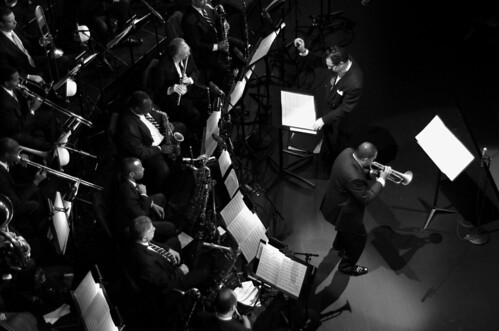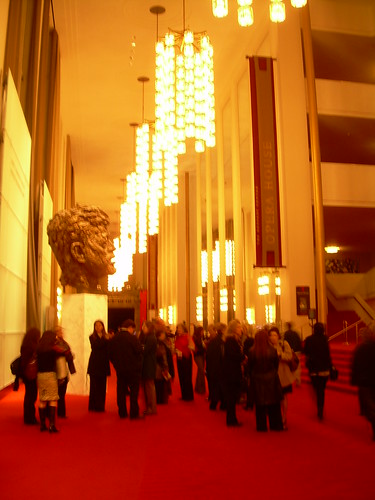
‘Sketches of Gill Evans’
courtesy of ‘vitelone’
The affection was clearly mutual: hundreds of arts advocates stood on their feet, applauding wildly for a full ten minutes. Jazz virtuoso Wynton Marsalis, flanked by a five-man band, stood staring back at them, tears streaming down his face. He has just spent an hour weaving the tale of music, art and American cultural identity, rendering all present effectively speechless.
Last night at the Kennedy Center, Marsalis gave the Nancy Hanks Lecture, the evening component of the 22nd annual Arts Advocacy Day, organized by Americans for the Arts. The lecture was established to honor Nancy Hanks, former President of Americans for the Arts and chair of the National Endowment for the Arts, and has featured many of the bright lights of the arts, including Maya Angelou, Dr. Billy Taylor and Robert Redford.
Born and bred in New Orleans, Marsalis, a Pulitzer-prize and Grammy-award-winning musician and composer, is, among other things, Artistic Director of Jazz at Lincoln Center.
The “lecture” — a strange term for the event despite it being as informative as any upper level history class — was punctuated by snippets of music performed by Marsalis and the band, peopled by members of the Jazz at Lincoln Center Orchestra.
Beginning with the constitution, Benjamin Franklin and Yankee Doodle, Marsalis laid out the artistic history of our nation, highlighting its interconnected nature. Edgar Allen Poe sang the blues before they were invented; the battle hymns of the north and south are just notes from the Mickey Mouse theme; the sexuality and sensuality of Walt Whitman’s Song of Myself can be found just as easily in Aunt Hagar’s blues. The American assertion of self and the exploration of freedom can be seen, Marsalis noted in his somewhat muted rasp, in artists from Louis Armstrong to Emily Dickinson and in tunes from negro spirituals to rock and roll.
While technology may change, Marsalis said, the technology of the human soul remains unchanged. The strains which moved our grandparents during the depression can still resonate today, or at the very least, those contributions laid the groundwork for music and art which is being created of their backs now. Despite our many differences throughout history, he asserted, Americans of all races and geographic locations have been able to converse and engage through art in an attempt to tackle the Big Questions.
This particular audience needed little convincing of Marsalis’ overall message–namely, the importance of arts education and creating an evolving, flourishing artistic identity. The arts group hits the Hill today to lobby for arts funding, armed with the mantra Arts=Jobs and accompanied by Josh Groban and Linda Ronstadt.
